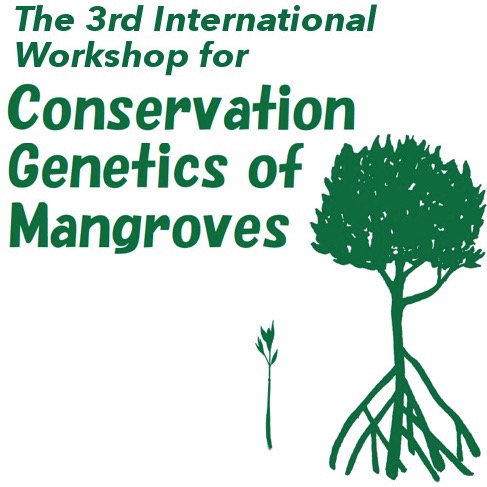Mangrove is a highly valuable ecosystem that is formed by mangrove forests. Because the distribution of mangrove forests is global in tropics ("Pantropical"), and because mangrove forests look huge and everywhere in tropics to our eyes, we tend to believe that mangroves are quite common on tropical coasts. However, we should understand that the area of mangrove forests are less than 1% of all tropical forests and that small numbers of widespread tree species compose mangrove forests. For example, a major mangrove tree species in Asia, Bruguiera gymnorhiza, distributes from E. Africa to S. Pacific, and in America, Rhizophora mangle dominates many mangrove forests. A small number of species play important roles to form the global mangrove forests and species level conservation of mangroves are also important even if they are widespread species. However, our understandings of those mangrove species are still limited, and concerning Genetic Diversity, which is one of three levels of biological diversity, we still haven't enough understandings. Under the present habitat degradation and fragmentation of mangrove forests on a global scale, we should recognise how mangroves species are genetically diversified among populations and the role of a local mangrove forests concerning effective conservation of mangroves. Because the distribution range of mangrove species are broad and over many different countries, international cooperation is highly required. In this regard, we started an international collaboration to established a research network for conservation genetics of mangrove in 2010, supported by Japan-East Asia Network of Exchange for Students and Youths (JENESYS) Programme promoted by the Japan Society for the Promotion of Science (JSPS). As a part of the exchange program, the First International Workshop for Conservation Genetics of Mangroves was held in Iriomote Island and the Second one in Okinawa in 2011. The Research Network for the Conservation Genetics of Mangroves was successfully established through these workshops with researchers mostly from Asia, and we have successfully performed various research projects since 2009 and have understood basic information for conservation genetics of mangrove by using neutral markers.

In the year 2016, we are going to have The 3rd International Workshop for Conservation Genetics of Mangroves, from 18th to 19th October 2016, again at the Iriomote Station, Tropical Biosphere Research Center (TBRC), University of the Ryukyus, Japan. The workshop is hosted by TBRC and University of the Ryukyus, and partially supported by The United Graduate School of Agricultural Sciences, Kagoshima University; JSPS KAKENHI; the Science and Engineering Exchange program with Latin America (SEELA), The University of Tokyo; and International Society for Mangrove Ecosystem (ISME). The main purpose of the workshop is to seek for further development of Conservation Genetics of Mangroves and to form new research networks on a global scale. With the recent rapid development of Next Generation Sequencing techniques, we are moving forward to open new windows for more profound understanding of Conservation Genetics of Mangroves on a Global Scale, especially focusing on Genomics, Epigenomics and Transcriptomics. In this 3rd workshop, we invite five oversea researchers from Brazil, Mexico and China, and nine Japanese experts from relevant fields. We seek for the ways to establish new research networks and solid frameworks for collaborations. I believe the workshop will play an important roles in the future studies of Conservation Genetics of Mangroves on a Global Scale.
Acknowledgement
We thank for the following supports to invite participants to the workshop.
- TBRC Joint Usage Project Grant 2016, Tropical Biosphere Research Center, University of the Ryukyus (to TK)
- International Researcher Invitation Program 2016, University of the Ryukyus
- JSPS KAKENHI (No. 25290080 to TK)
- International Meeting Support 2016,
The United Graduate School of Agricultural Sciences, Kagoshima University-
International Society for Mangrove Ecosystem (ISME)-
Science and Engineering Exchange program with Latin America (SEELA), The University of Tokyo




